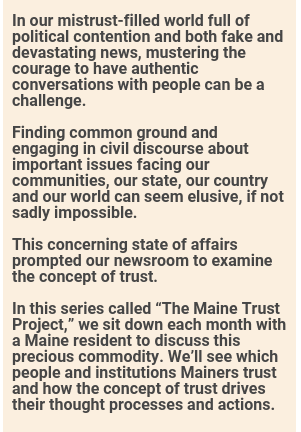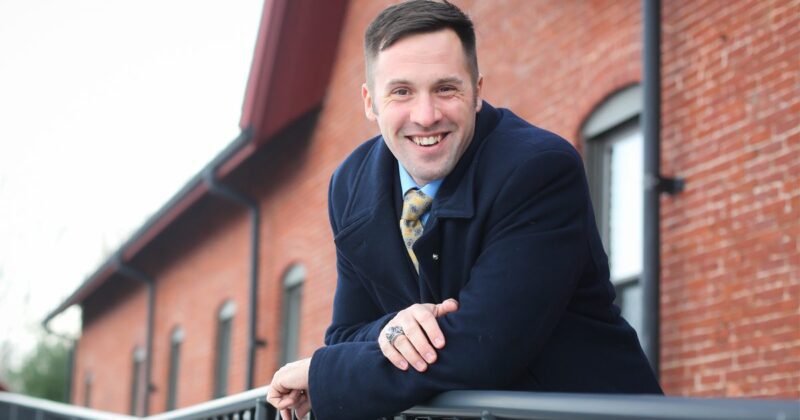Joe Reagan was just 22, a new graduate of Norwich University, a private military academy in Vermont, and had just completed 10 months of training as a second lieutenant in the Army when he arrived in Afghanistan for his first tour there with the 10th Mountain Division.
As a leader of a platoon of 28 men (women weren’t allowed in combat roles at the time) that scouted locations in advance of the rest of the division, he felt “extremely underqualified” for the role, he says. He was in a place that was unlike anything the Massachusetts native had experienced before.
 Over the course of 16 months, the platoon’s casualty rate exceeded 100 percent, and every member of the platoon, he says, including himself, although he won’t tell you so, was awarded the Purple Heart, sometimes more than once. One guy, he noted, had four. The running joke in the platoon was that while that guy had good luck, “don’t stand next to him.”
Over the course of 16 months, the platoon’s casualty rate exceeded 100 percent, and every member of the platoon, he says, including himself, although he won’t tell you so, was awarded the Purple Heart, sometimes more than once. One guy, he noted, had four. The running joke in the platoon was that while that guy had good luck, “don’t stand next to him.”
All joking aside, to say that trust is crucial in combat situations is an understatement.
“Think of it on an exaggerated scale,” Reagan says. “You’re going to go into a building. There’s seven of you. You’re going to open a door. You have no idea what’s behind it. You’re all going to run (through) this door with loaded weapons. A little bit of trust has to happen there.”
“At that moment when that door’s about to open, I’m literally putting my life in the hands of that guy behind me, trusting in the purest definition of the word that he – or she – is going to do exactly what they’re supposed to be doing. ’Cause if they don’t do what they’re supposed to be doing – which might be against their self-interest – then I’m potentially at risk. And they’re trusting the same thing of me. I might do things that are against my own self-interest in order to make sure that I’m looking out for them.”
Today, after more than seven years in the Army in roles that were both operational and in intelligence, he still looks out for those who placed so much trust in each other.
As a representative of Easterseals’ Veterans Count, a program that provides assistance to veterans, active-duty members and their families, he spends many of his days crisscrossing the state talking to veterans to understand their challenges and how Veterans Count can help.

It’s a humbling experience. Some of the vets face homelessness, unemployment or underemployment, and many face issues with their physical and mental health.
It would be easy to fall into the trap of seeing himself as different from the veterans he helps, he reflects, but instead, his conversations with fellow veterans constantly remind him that there are no “other veterans.” He faces the same struggles as they do; he just has different circumstances. In a time when divisiveness is played up in our society, that’s a reminder he likes getting – and passing on.
Q&A
Who meets your definition of trust on a personal level and on a non-personal level?
Joe: I think trust is a spectrum and trusting someone is a deeply personal decision. There’s certain layers of trust. To trust someone fully is a deeply personal connection, so I place full trust in a fairly limited group of people: certainly my wife, and many of my family members and some select friends. People I can look at and say, ‘yep, you’re going to make decisions in my best interest.’
On a non-personal level, I think as a community, we always put some level of trust in each other. I trust that others will stop at the red light, although, I’ve been proven wrong sometimes — and I have proven people wrong sometimes.
And we trust that big businesses and small ones are going to deliver what we’re expecting. When they don’t, it can destroy a business. Think of the Volkswagen emissions scandal. They’re still digging out from that and it will always be a mark on them. One bad thing can immediately wipe out 100 good things, so that’s a lesson for those in positions of trust: it’s critically important to actively maintain trust.
Who doesn’t meet your definition and how do they fail to meet it?
Joe: I guess the best way to describe it would be cheaters. Those who are making false claims. That, when given an opportunity to make decisions on the behalf of others, are making those decisions purely in their self-interest as opposed to mutual benefit.
I think you see a lot of examples of that in the political environment — where you have people that are making decisions driven by politics rather than sound policy. That is something that is hugely disturbing to me. Political office is the ultimate form of public trust. I’m sending you down there to make decisions and to cast a vote that’s going to benefit not just me personally but our community and those around us. There’s always going to be the chance that policy that’s good for all might not benefit others quite as much. Then that’s the part of what we’re trusting these elected officials to do: to be fair arbitrators so that when decisions can’t benefit everyone, they make the effort to do it in such a way that’s going to be best for most.
What breaks trust for you and can broken trust be healed?
Joe: I think a lot of it is in the intent. Outcomes can go awry; some situations you can’t control. But if you intended all along to just be deceptive and make decisions in your own self-interest, that’s going to be quick to break that trust.
For me, it takes a lot to earn trust, so if one bad action can destroy a 100 good deeds, then it takes a 1,000 good deeds to make it back again. I cannot think of a single instance where someone has violated my trust and has gotten a second chance. I wouldn’t say that they’re not getting a second chance; I would just say that it’s going to take a long, long time for someone to get back to a point where I can say, ‘OK, I’ll trust you to make that decision on my behalf.’
What worries you?
Joe: We want to put a tremendous amount of trust in our public officials, but more and more we see an environment where you have both parties promoting party and politics over policy. Look at any example that’s come out of the Legislature — state or federal — in the past 10 years and all of them are based on the worst elements of compromise. There are so many examples of laws that could have been better written or that left out certain components because it was against someone’s political agenda. The Affordable Care Act, for example, could have been so much stronger if a couple of changes that would have reduced healthcare costs had been made. Instead, for example, we’re just putting more people on the Medicaid roster. Someone’s still paying for that healthcare.
What inspires you?
Joe: Kids inspire me. I was talking to neighbors the other day and they said their kids and their friends keep certain features on their Instagram accounts active so they can look out for one another. If they realize that one of their friends is still at a party when everyone else has left, (they) call or text and say ‘why are you still at that party?’ Or ‘do you need us to come get you?’ How they’re able to leverage technology not just to point fingers but to really enable them to be better members of the community — that inspires me.
What issues on the state or local or national or international level do you think are really important?
Joe: Being better stewards of information in terms of transparency, nationally and internationally, and making sure that those who have access to information are good stewards of it. Take the intelligence community, for example. While there is some information critical to national security and keeping us safe, being transparent when we can with our allies of what our intentions are is important, too. And being transparent also allows us to find areas where we can come together to do better for the broader community.
We can’t always operate only in our self-interest. If history has taught us nothing, it’s that self-interest in nation-state politics doesn’t work out well. We just celebrated the 100th anniversary of the ending of what was supposed to be the war to end all wars. But treaty negotiations following the end of fighting didn’t quite meet expectations because we all retreated towards self interests. Global politics is not a transactional environment. It is complex and it is fluid. We can have multiple winners. I think that that’s something we need to work towards, but I’m not seeing that.
Get to know Joseph Reagan
Age: 37
Hometown: Scarborough
Religious affiliation: None
Political affiliation: None
How he describes himself: Very social.
How he defines trust: I think that when you experience trust, it’s surrendering control to somebody or something else. When I was in college, I did a lot of rock climbing and I did mountain rescue. It was amazing the number of times in training that I would say or be told ‘trust the equipment.’ That means a lot when you’re about to put yourself over a cliff and hang by this rope and trust that the rope’s going to hold; the knot I tied on the end of the rope is going to hold; that the harness I put on was properly assembled.
So, I think what trust boils down to is saying I can’t control the outcome of what’s happening here, so I’m going to trust in you — or the harness or whatever — to make sure that things wind up in a way that’s going to be beneficial to me — or at the very least, not harmful to me.




